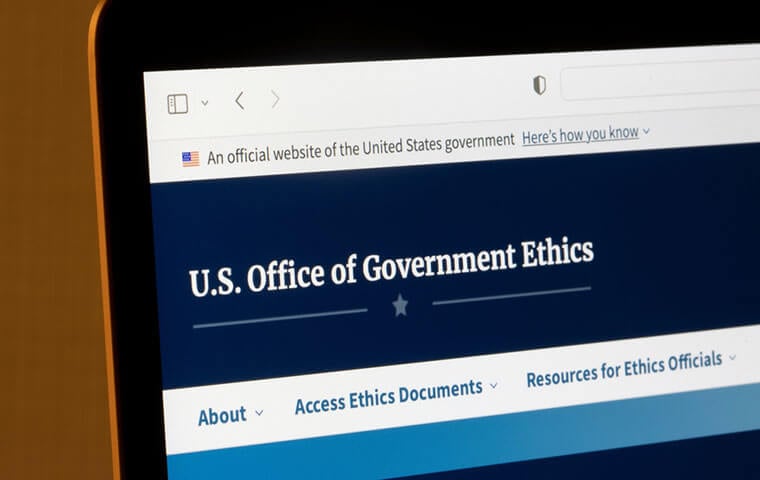 Image: Tada Images/Shutterstock.com
By: FEDweek Staff
Image: Tada Images/Shutterstock.com
By: FEDweek StaffThe Office of Government Ethics has produced its annual tally of prosecutions of federal employees under conflict of interest laws, a report serving as a reminder that some federal employment ethics laws carry potential criminal consequences as well as career consequences.
“The survey highlights how the Department of Justice enforces the criminal conflict of interest laws, and is a useful resource ethics officials can use to educate employees about how these laws apply in real-world situations,” the OGE said.
The summary shows eight cases against federal employees were resolved either through a judicial judgment or a settlement in 2023, several below that of immediate prior years.
The cases included charges of bribery, false statements, acts affecting a personal financial interest, violating post-government employment restrictions, filing fraudulent claims and conspiracy to commit an offense against the United States, among others.
According to another recent OGE summary of a questionnaire on agency ethics programs covering 2023, penalties for ethics violations spanned imprisonment, supervised release, probation, fines and other assessments. The number of disciplinary actions such as removals, demotions, suspensions, and written reprimands or their equivalents totaled 609. From top to bottom, those were attributed to:
Subpart A (General Provisions) 107
Subpart B (Gifts from Outside Sources) 17
Subpart C (Gifts Between Employees) 4
Subpart D (Conflicting Financial Interests) 8
Subpart E (Impartiality in Performing Official Duties) 27
Subpart F (Seeking Other Employment) 10
Subpart G (Misuse of Position) 270
Subpart H (Outside Activities) 65
Agency’s supplemental Standards of Conduct 117
The ethics program summary also stated:
Over 99% of the more than 450,000 employees required to file public and confidential financial disclosures did so;
92% of the more than 380,000 new employees timely received their required initial ethics training;
97% of the more than 420,000 employees required to receive annual ethics training did so;
Executive branch employees sought ethics guidance on: (1) outside employment/activities, (2) gift acceptance, and (3) financial disclosure reporting;
Their agencies collectively received nearly 1,500 requests for nearly 25,000 documents requested under the Ethics in Government Act.
Shutdown Meter Ticking Up a Bit
Judge Backs Suit against Firings of Probationers, but Won’t Order Reinstatements
Focus Turns to Senate on Effort to Block Trump Order against Unions
TSP Adds Detail to Upcoming Roth Conversion Feature
White House to Issue Rules on RIF, Disciplinary Policy Changes
Hill Dems Question OPM on PSHB Program After IG Slams Readiness
See also,
How Do Age and Years of Service Impact My Federal Retirement
The Best Ages for Federal Employees to Retire

